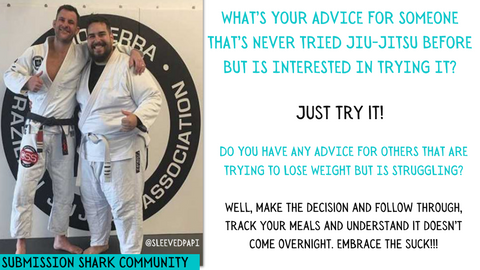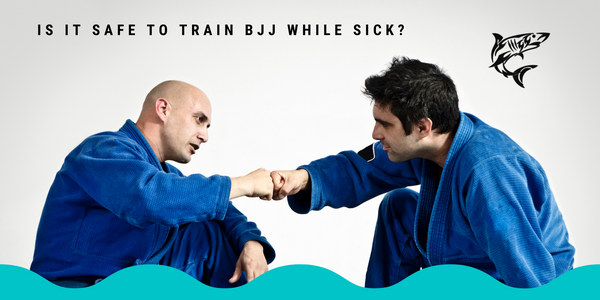When to Start Training BJJ: The Ultimate Guide
Do you want to start training Jiu-Jitsu but don't know when the best time is? Are you afraid that you're too old or not fit enough? Don't worry, we're here to help!
In this blog post, we will discuss the different factors that you need to consider when deciding when to start Jiu-Jitsu training. We'll also provide some tips on how to get started!
So, when is the best time to start Jiu-Jitsu? The answer to this question depends on a variety of factors, including your age, fitness level, and experience. Here are some general guidelines:
Can You Be Too Young To Start Training BJJ?
If you're young (under 18), do not worry because starting young is a great idea with more and more youth BJJ athletes training together. Many jiu jitsu practitioners start at a young age, even as toddlers.
It's up to the parent or guardian as well as the child if they are ready to begin the martial arts journey. One important thing to note is that Jiu-Jitsu involves a lot of physical contact, and both the child and adult should be aware of this.
When It's Time Find A New BJJ School

Finding the right BJJ academy for you is essential as a BJJ beginner because you don't want to have to unlearn any bad habits. This Submission Shark / Mcdojo guide should help you discover exactly what to avoid when searching for a martial arts school. This is helpful for any new martial artists, regardless of age.
What If I Am Already Fit?

If you're new to martial arts or fitness in general, it's usually recommended that you start with beginner classes. These classes will teach you the basics of Jiu-Jitsu and help you get accustomed to the physical demands of training.
Even if you're fit and have some experience with other martial arts, you will most likely be asked to start training BJJ at the beginner's class until the instructor feels you are ready for more advanced training.
Fitness can be a great lifestyle that supports longevity and has its benefits on the mats but the knowledge and application of the techniques is what sets apart the BJJ practitioners and general fitness athletes.
It's also a common reason why smaller people train jiu-jitsu so they can feel empowered with applicable techniques that work, even on stronger people. This is why you don't have to be already strong and fit to begin training BJJ
Can I Start Training BJJ If I Am Overweight?
If you are overweight, it is important to consult with your doctor before starting any new exercise program. Jiu-Jitsu can be a great way to lose weight and get in shape, but it's not the right choice for everyone.
It's commonly believed by people looking to begin training BJJ that they have to get fit first before they step onto the mats. Although this isn't necessarily true, here is a real life example of someone that was overweight and lost weight through BJJ training itself!
Once you've gotten the green light from your doctor, start by attending beginner classes and work your way through the ranks at your own pace.
These are just general guidelines, so please speak to your instructor as well if you're unsure about when to start Jiu-Jitsu training. They will be able to advise you based on your individual situation.

When You Should Not Start Training Jiu-Jitsu?
You should consider to wait until you are ready to use this new knowledge in a productive or self-defense manner. If you are looking to pick a street fight the moment you walk in, it may be better to enter when you are ready to leave your ego at the door. Although a lot of new practitioners will become humbled after the first few classes.
It's important to know that many academies will open their doors to anyone, despite their backgrounds but they can also ban you if you aren't ready to respect their guidelines and rules.
Tips For When You're Starting BJJ Training
- Respect and Ensure You Understand The Rules
Each school will have their own customs but some common rules that will get you banned would be if you didn't let go of a submission when your training partner taps, going to the wrong gendered change room on purpose or other sexual misconduct, discrimination against others etc.

When you are just starting BJJ, see if their policies ensures your comfort so you don't fall victim to being a part of a gym with training partners or even coaches not respecting your personal boundaries.
- Bring The Right Gear To Training
Understand if you are planning to train no-gi, just gi, or both. You would also want to bring a water bottle and a mouth guard when you are ready to begin rolling. You can find some great BJJ rash guards, Jiu-Jitsu spats and BJJ gis for beginners here on Submission Shark for all ages.
3.Watch and Learn?
Ask if you can sit in and watch for the first few classes to see if you would be comfortable participating. This can be helpful, especially as a parent wondering when they should put their child into BJJ training.
Although you may not want to sit on the sidelines forever, this story can be helpful for you if you are interested and already watching but don't know when to actually step onto the mats.
4.Read more Submission Shark articles to get a better understanding of the sport/art.
This website's 'School of Sharks' section and 'community' section is designed to be a free resource for you to explore throughout your journey, whether you are just starting or have already achieved high ranks.
You can see testimonials of the effectiveness of BJJ from other practitioners and learn from their experiences in the 'community' section. The 'School of Sharks' is filled with a broad range of helpful topics such as injury prevention, recovery, nutrition, athletic performance and more!
Although it is helpful to read and learn from this website and many others, it's best to just give it a try since you are clearly interested for reading this far into this jiu jitsu article!
How Can I Train BJJ If I Don't Have Much Time?

All you need is a Gi and some basic training gear which you can get from your Jiu-Jitsu school or on this website (Submission Shark). But what about time?
Many academies offer beginner classes that are designed for students that have limited time or may be working full-time.
If you're unable to attend these beginner classes, Jiu-Jitsu schools will often have open mat times where advanced practitioners help beginners learn and train techniques. These open mats are also a great opportunity for you to roll with other people of all belt ranks and experience different types of Jiu-jitsu.
If You Are Still Unsure About When To Start BJJ Training?
Please don't hesitate to contact us! We would be more than happy to answer any questions that you may have about starting your Jiu-jitsu journey. If you need help finding a BJJ gym near you, we will happily do our best to recommend an academy that fits your needs. Just contact us here!
More Resources For BJJ Beginners
You can also learn more information if you are wondering when to start training BJJ such as:
We cover many more topics perfect for BJJ Beginners in this helpful section on our website www.submissionshark.com






































Leave a comment